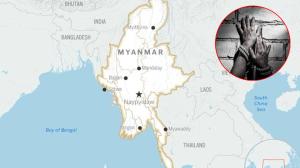
Massachusetts, Boston: Prahlad Iyengar has described MIT's decision as "unprecedented" and a violation of free speech rights.
An essay supporting the pro-Palestine movement has resulted in the suspension of Prahlad Iyengar, an Indian-origin PhD student at the Massachusetts Institute of Technology (MIT), according to The Commune. The essay, titled On Pacifism, was published last month in Written Revolution, a student-run magazine centered on the pro-Palestine cause.
Reports indicate that MIT has banned Iyengar from campus and revoked his National Science Foundation Graduate Research Fellowship, citing claims that the essay advocates violence. The essay reportedly featured a logo associated with the Popular Front for the Liberation of Palestine (PFLP), which the US State Department classifies as a terrorist organization. Iyengar has denied promoting terrorism, stating that he was not responsible for including the controversial imagery.
Iyengar clarified in a statement shared by his lawyer, Eric Lee, on X (formerly Twitter) that the administration accuses him of supporting terrorism because the edition with his article includes images of posters associated with the Popular Front for the Liberation and portrays violent themes.
December 5, 2024
This marks Iyengar's second suspension at MIT; he had previously faced disciplinary action for participating in pro-Palestine demonstrations on campus. Addressing the latest incident, he called MIT’s actions an "extraordinary" attack on freedom of expression.
He warned in his statement that expelling him and banning Written Revolution from the campus over this article would create a risky precedent for the rights of both students and faculty.
In protest of MIT’s decision, the MIT Coalition Against Apartheid has launched a campaign in support of Iyengar. "Prahlad is appealing to the Chancellor to reduce these unwarranted sanctions," the group stated. "We call on organizations and institutions to reject MIT's actions and express their solidarity."












